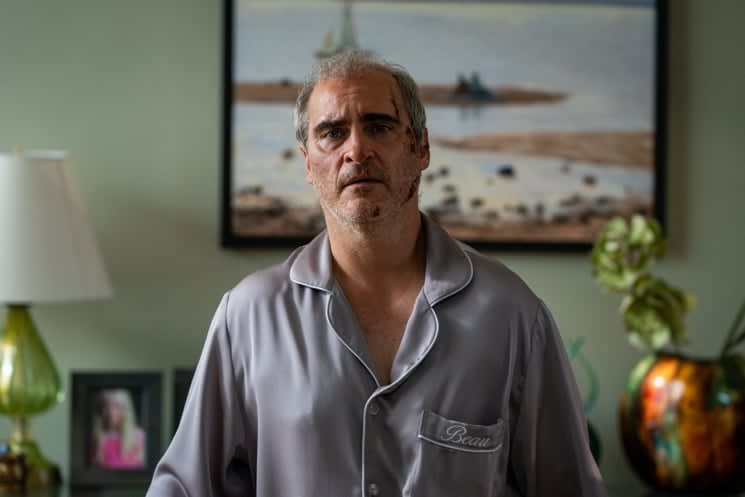When I saw 2019's Midsommar in the theatre, someone down the aisle from me spent much of the movie scream-whispering at her seatmate, repeatedly hissing things like, "What the fuck is going on!? Why would you bring me to this?!" That kind of thing would normally be annoying, but it felt strangely appropriate for Ari Aster's gross, disturbing and weirdly funny horror movie, helping to cut the tension and adding to the outrageousness of the experience.
I can only imagine what she would think of Aster's follow-up, Beau Is Afraid, a film that's much less scary but also significantly more bizarre and primed for psychoanalysis. An absurdly maximal, wildly surreal fever dream, Beau Is Afraid feels like being pinned down by your sleep paralysis demon while it crouches on your chest and screams dick jokes at you.
Beau Is Afraid starts a bit like a pandemic parable, with Beau (Joaquin Phoenix) trapped in his apartment while chaos rages outside. There's a naked guy stabbing people, street vendors selling AR-15s, dead people lying in the middle of the street and onlookers laughing while filming a suicide jumper— a post-apocalyptic scene that perfectly conveys the agoraphobia and health-related paranoia of the past few years. Every shot is filled with ridiculous details, from the comical food packaging to the lewd products advertised on the sex shop downstairs.
Even minor tasks seem to take forever: a phone call to Beau's mom is filled with excruciating pauses and miscommunications, and a trip to the store across the street for a bottle of water feels nearly impossible, evoking the pedantic frustrations of Brazil and the perception-warping quirks of Charlie Kauffman.
It's a weird beginning that only gets stranger, as the three-hour film careens through a number of different sections, which are strung together with dream logic. Reality gets totally destabilized in the stream-of-consciousness plot, throwing Beau into new scenarios with little sense of how exactly he got there.
In this series of loosely connected vignettes, a theme eventually emerges, presenting an overall framework that offers some clarity about the film's disparate passages (as well as calling back to ideas explored in Aster's 2018 debut Hereditary). It's the work of an acclaimed filmmaker operating with maximum confidence; after two critically beloved hits, Aster has created a vulgar and grotesque cinematic universe that's blatantly alienating, with elongated scenes that serve little plot purpose but effectively immerse viewers into this fucked-up version of reality.
The film spans genres and tones, but it's ultimately a comedy — albeit an exceptionally dark one — with even the most serious moments suddenly taking jarring turns into slapstick sex jokes. It's quite remarkable that, in making a comedy, Aster has created something even more depraved and unsettling than his horror movies.
(Sphere Films)I can only imagine what she would think of Aster's follow-up, Beau Is Afraid, a film that's much less scary but also significantly more bizarre and primed for psychoanalysis. An absurdly maximal, wildly surreal fever dream, Beau Is Afraid feels like being pinned down by your sleep paralysis demon while it crouches on your chest and screams dick jokes at you.
Beau Is Afraid starts a bit like a pandemic parable, with Beau (Joaquin Phoenix) trapped in his apartment while chaos rages outside. There's a naked guy stabbing people, street vendors selling AR-15s, dead people lying in the middle of the street and onlookers laughing while filming a suicide jumper— a post-apocalyptic scene that perfectly conveys the agoraphobia and health-related paranoia of the past few years. Every shot is filled with ridiculous details, from the comical food packaging to the lewd products advertised on the sex shop downstairs.
Even minor tasks seem to take forever: a phone call to Beau's mom is filled with excruciating pauses and miscommunications, and a trip to the store across the street for a bottle of water feels nearly impossible, evoking the pedantic frustrations of Brazil and the perception-warping quirks of Charlie Kauffman.
It's a weird beginning that only gets stranger, as the three-hour film careens through a number of different sections, which are strung together with dream logic. Reality gets totally destabilized in the stream-of-consciousness plot, throwing Beau into new scenarios with little sense of how exactly he got there.
In this series of loosely connected vignettes, a theme eventually emerges, presenting an overall framework that offers some clarity about the film's disparate passages (as well as calling back to ideas explored in Aster's 2018 debut Hereditary). It's the work of an acclaimed filmmaker operating with maximum confidence; after two critically beloved hits, Aster has created a vulgar and grotesque cinematic universe that's blatantly alienating, with elongated scenes that serve little plot purpose but effectively immerse viewers into this fucked-up version of reality.
The film spans genres and tones, but it's ultimately a comedy — albeit an exceptionally dark one — with even the most serious moments suddenly taking jarring turns into slapstick sex jokes. It's quite remarkable that, in making a comedy, Aster has created something even more depraved and unsettling than his horror movies.
